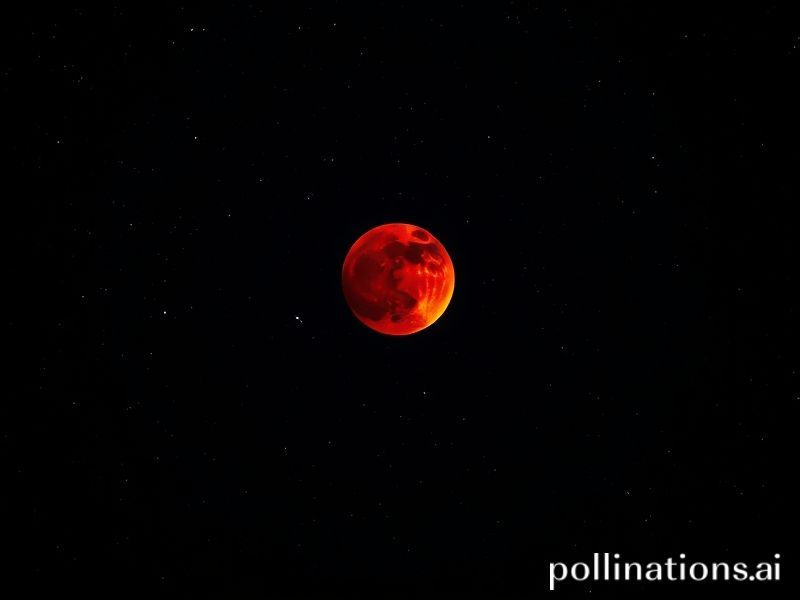Blood Moon Total Lunar Eclipse: When the World Pauses to Gawk at a Cosmic Bruise
Blood Moon Diplomacy: How a Rust-Colored Orb Became the World’s Most Honest Mirror
——————————————————————–
Tonight the moon will slip into Earth’s shadow and emerge the color of dried blood—an unsubtle reminder that even celestial bodies can’t escape a decent bruising. Across every time zone, billions of necks will crane skyward to witness the same bruised disc, a moment of planetary solidarity that will evaporate the instant someone checks their phone and remembers who owes them money.
The technical term is “total lunar eclipse,” but “blood moon” plays better on push alerts and protest placards alike. The phenomenon occurs when sunlight refracts through Earth’s atmosphere, scattering blue wavelengths the way Twitter scatters nuance. What’s left is a copper coin hanging in the void, simultaneously priceless and worthless, much like most international summits.
In Jakarta, street vendors hawk eclipse glasses next to knock-off Louis Vuitton. In Berlin, techno DJs sync bass drops to the shadow’s creep. Meanwhile, on the outskirts of Kyiv, soldiers use the extra darkness to change positions; the moonlight, filtered through stratospheric ash, is dim enough to move undetected but bright enough to read the last letter from home. Somewhere in Silicon Valley, a start-up founder live-tweets the spectacle as proof that “space is the ultimate subscription model,” then immediately trademarks the phrase “Blood-as-a-Service.”
Astrologers—those freelance diplomats between panic and profit—declare the eclipse a cosmic reset button. Western newsletters warn of “financial volatility,” while Chinese social media influencers promise “auspicious realignment for water signs and semiconductor stocks.” In Lagos, WhatsApp groups circulate voice notes claiming the moon will “reverse all curses placed since 1999,” a service Vodafone still can’t provide. The global south, long lectured about superstition, watches the north monetize mysticism with NFTs of the moon’s shadow and feels the familiar warmth of colonial déjà vu.
Climate scientists, ever the life of the party, note that volcanic eruptions in Tonga and wildfires in Canada have pumped extra particulates into the stratosphere, deepening the crimson hue. In other words, the planet is literally coloring its own nightlight with its self-inflicted wounds. It’s like watching someone light a cigarette to read the surgeon general’s warning on the pack.
Politicians, never ones to waste a free metaphor, line up to compare the eclipse to whatever crisis they’re failing to solve. A Brazilian senator tweets that the moon looks “as red as our fiscal ledger,” conveniently ignoring the part where he voted to set the rainforest on fire. The UK’s Deputy Prime Minister calls it “a stark reminder that even heavenly bodies can be eclipsed by hubris,” apparently forgetting he still hasn’t resigned. The UN issues a press release urging “multilateral cooperation in lunar appreciation,” then adjourns to argue about the seating chart.
And yet, for one synchronized hour, international borders are as meaningless as the “do not consume raw cookie dough” label. Refugees in Jordan and retirees in Florida squint at the same orb. A kid in Mumbai sketches it in crayon; an algorithm in Seoul turns the sketch into a $9.99 phone wallpaper. Somewhere in Antarctica, a lone researcher steps outside, hears nothing but wind, and realizes the moon is the only thing that hasn’t asked for her papers.
When the shadow finally recedes, the moon will bleach back to its default smug silver. News cycles will pivot to fresher disasters, and astrologers will mail invoices. But the residue remains: we all looked up at the same scarred witness, briefly admitting—if only by collective silence—that we share one sky, one atmosphere, and one rapidly expiring warranty.
The blood moon won’t solve inflation, wars, or the fact that your landlord just raised rent again. It will, however, remind everyone that even cosmic spectacles can’t compete with push-notification dopamine. Still, for sixty-three minutes, the universe managed to schedule a global conference nobody could boycott, ghost, or monetize with a QR code. That’s worth at least a cynical nod before we go back to doom-scrolling.







